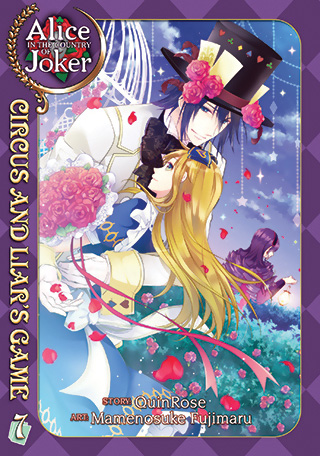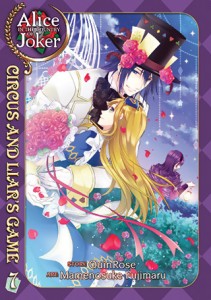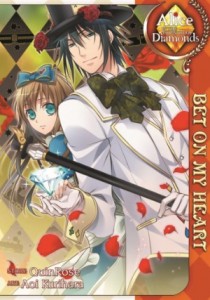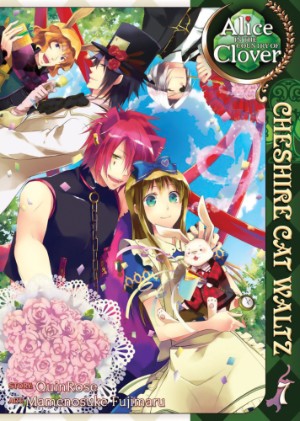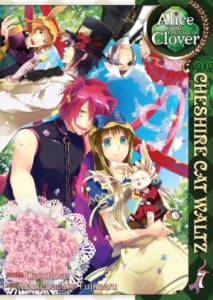By Quin Rose and Mamenosuke Fujimaru, based on the game by Quin Rose. Released in Japan as “Joker no Kuni no Alice – Circus to Usotsuki Game” by Ichijinsha, serialized in the magazine Comic Zero-Sum. Released in North America by Seven Seas.
This review contains spoilers for the “Bad End” of the visual novels.
Of all the Alice spinoffs, this one is clearly my favorite, and I’ve said why in previous reviews I did for Bookshelf Briefs. The romance between Alice and Blood doesn’t overwhelm the story. There isn’t as much painful filler the way some of the lower-tier Alice spinoffs have, where you can find yourself in Crimson Empire at the drop of a Hatter subplot. But mostly I think I like it as the main plot is very much dedicated to psychological trauma, Alice’s in particular but also everyone else. Time after time in Circus and Liar’s Game we see her back in the prison, with her sister Lorina sitting in a cell that only Alice can open. Joker is taunting her, trying to get her to face up to the memories of her past that she avoids. And the entire rest of the cast tries to stop her, and get her to stay there and not remember.
We’re never going to get a ‘bad end’ in these spinoffs, and I think it’s a shame, because the more I read of this series the more I think I really want to see it. Alice remembers that her sister is dead, and wakes up back in the real world, clearly older than the franchise has been portraying her, and having apparently been completely devastated by the loss. Thus staying in Wonderland – kept in that “Sunday Afternoon” that Peter White represents – is denial of reality, and the inability to grieve and move on with her life. And it’s clear that the series, in almost all its endings, really wants you to pick ‘denial’. Throughout Circus and Liar’s Game, Alice is tempted by Joker, and we do cheer when Blood confronts Joker and even takes a wound in order to stop her giving in. In the end, she even marries Blood. But is it really a “happy ending”?
There are two reasons I ask this. The first is the epilogue of this volume, where Alice ends up in the Country of Diamonds after a fight with Blood, and is horrified to find that every relationship she’s had is lost. Blood in particular is not the one she knows, even though he’s still willing to protect her if need be. The best part of this is that it’s not Joker tempting Alice to return to reality in this world, but Ace. Ace has always functioned as the most dangerous protagonist, the one who only loves Alice when she’s upset, fretting or struggling. Here she’s his ideal (and it’s worth noting that we see “adult” Ace here, not the teenage one from the Diamonds VN). That said, the epilogue can’t bring itself to destroy its happy ending, and she chooses to return to her Blood, who she wakes up with.
The other interesting thing is what Alice chooses to become, and how it ties into Blood and Vivaldi. As with the main Alice series, their relationship is a key aspect of the plot here. We get flashback hints (which I suspect I’d understand more if I played the game, but that machine translation drives me up the wall) that they aren’t just brother and sister, but were once like Alice herself. And that’s what makes the ending extra disturbing, as Alice’s ‘Outsider’ status is now considered a Role, one she willingly takes on. Does this mean that she has a clock in her chest now? It’s possible I’m reading too much into this, but I think in the end I’m like Ace. I like the Alice series best when it’s troubled, disturbing, and has nasty implications. Even if Alice is getting great sex with Blood and happy endings. This Circus and Liar’s Game has been a terrific look at the psychology of the series.
(Also, Alice looks fantastic in that Negotiator outfit. She should wear it more often.)
